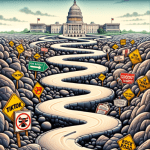Toward the 32-hour work week: the Democrats’ breakthrough with IA’IA

March 24, 2024
Senate Democrats, led by Senator Bernie Sanders, have introduced a bill calling for a 32-hour work week. The proposal is based on advances inartificial intelligence andautomation, arguing that these developments warrant a reduction in working hours. However, experts are divided on the impact of a shorter work week on overall productivity.
Democrats call for a shorter workweek
During a Senate Health, Education, Labor and Pensions Committee hearing, Senator Sanders pointed out that despite growing technology and worker productivity, millions of people in the United States work long hours for low wages. He pointed out that Americans work longer hours than other developed nations and advocated for a shorter work week.
The bill introduced by Sanders and Senator Laphonza Butler calls for a gradual reduction of the work week from 40 to 32 hours over four years. It also stipulates that non-exempt employees should receive compensation for hours worked over eight hours a day, calculated as 1.5 times the hourly rate, and twice the hourly rate for hours worked over 12 hours. The proposal also guarantees that the total weekly wage will not be reduced due to the reduction in hours worked.
Mixed opinions on the impact of the shorter work week
Experts have differing opinions on the effect of a shorter work week on overall productivity. Boston College sociology professor Juliet Schor argued that the hourly productivity of both workers and managers would increase with a 32-hour work week. Her research also found that employees experience increased well-being outside the office.
Jon Leland, director of strategy at crowdfunding platform Kickstarter, testified that the company experienced an increase in goal achievement and employee retention rates after adopting a four-day work week.
However, another witness, Liberty Vittert, questioned studies that have shown increased productivity with a shorter work week. According to Vittert, these productivity improvements disappear over time. He also suggested holding a hearing on the impact of AI on the economy.
Political reactions to the bill
Republicans have criticized the bill, arguing that it would hurt small businesses and sectors such as retail stores, which must stay open six or more days a week. Senator Bill Cassidy said the proposal would be “napalm on the fire of inflation.” Senator Mike Braun said the proposal would put at risk hundreds of businesses that would not be able to survive.







